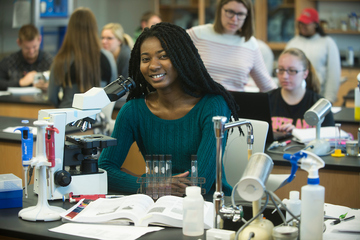Bulletin News

07/20/2021
SUNY Cortland has joined an alliance of colleges and universities across Central New York in using a nearly $2 million federal grant to attract and retain students from underrepresented backgrounds in science, technology, engineering and mathematics (STEM).
The Central New York LSAMP (Louis Stokes Alliances for Minority Participation) Alliance will use a $1.99 million grant from the National Science Foundation from 2022 to 2025 to build preparedness and community among underrepresented students in STEM.
Patricia Conklin, professor and chair of the Biological Sciences Department, will direct the program at SUNY Cortland. Christa Chatfield, associate professor in the Biological Sciences Department, will serve as co-director.
A planned series of workshops, seminars, community-building exercises and one-on-one research experiences with faculty are designed to help first-year and transfer students thrive in the sciences.
“The main goals are to increase the number of these students in STEM majors, retain them as STEM majors and have them graduate and either obtain jobs in STEM fields or enroll in STEM-based graduate school programs,” Conklin said.
The alliance, led by Ithaca College, also includes SUNY College of Environmental Science and Forestry, Elmira College, Hobart and William Smith Colleges, Herkimer College and Tompkins Cortland Community College.
At Cortland, first-year students accepted into the program will first participate in a series of online summer workshops hosted by The Learning Center. The workshops will help students build fundamental skills, such as study habits and time management, while introducing them to each other and SUNY Cortland. The students also will enroll in a quantitative and technical skills building STEM-specific workshop to help them be successful in their first year STEM coursework.
Prior to the start of their first semester, the students will spend two nights at the university’s William H. Parks Family Center for Environment and Outdoor Education at Raquette Lake, doing biology and chemistry research on lake acidification in the Adirondacks. When the students return to campus, they will participate in a half-day workshop on writing in the sciences and complete a one-hour lab to further prepare them for the start of classes.
Students also will meet with their academic advisor and peer mentors before classes begin to better acclimate them to campus and help them feel invested in the community.
During the fall semester, students will:
- Meet their academic advisors again early in the semester
- Meet early and one-on-one with the STEM faculty member who is teaching their fall STEM course
- Attend two seminars, featuring visiting underrepresented scientists who will speak on their career path and their research
- Participate in regular social events and a community-building activity with other students in the program
The spring will consist of a quarter course seminar that will differ slightly for first-year students and transfer students.
First-year students will research a career of particular interest and interview a professional in that field. They will then develop communication skills by presenting their findings to other students in the program.
Transfer students will do 20 hours of STEM-related community service around Cortland. Conklin says she hopes to have student ideas drive their choice of community service, but possibilities include working with Lime Hollow Nature Center, the Cortland County Health Department, Guthrie Cortland Medical Center or local schools.
Throughout the academic year, students from across the alliance will be grouped together virtually by major to participate in regular meetings, share their findings and support one another academically. And the alliance will implement ongoing professional development for faculty mentors in the initiative to increase research mentors’ skills in supervision/coaching, relationship development, and creating equity and inclusive environments.
“There has been a lot of research on the importance of sense of community and community-building for these students within their STEM major,” Conklin said. “If students feel like they’re part of the core biology community (for example), that helps with student retention and success. Often, these students are coming from someplace that is more diverse and coming into a place that’s less diverse. Feeling that they’re a part of something, the research has shown, makes a difference. Getting to go to Raquette Lake, getting to know each other and working together doing science helps build that sense of community.”
The program will culminate with an eight-week summer research experience with SUNY Cortland faculty that will include a stipend and no-cost on-campus housing. Cortland will host up to eight students each summer and the experience will be modeled after the SUNY Cortland Undergraduate Summer Research Fellowship Program.
The NSF grant funds 40 summer research positions across the alliance. Interested community college students from Herkimer and Tompkins Cortland will be able to participate in research at one of the four-year institutions.
All of the colleges and universities will come together for a symposium at the end of each summer where students will present research. The alliance also plans to create a network of internships and opportunities through alumni and faculty connections that may support students after they have passed through the program.
“After their first year, some underrepresented students in STEM leave college altogether or change to non-STEM majors,” Conklin said. “We’re hoping that this intense pre-first year and first year programming, and the research experience after the first year will help stem out that flow.”
Louis Stokes Alliances for Minority Participation were created by the NSF in 1991 to diversify the nation’s STEM workforce by increasing the number of STEM baccalaureate and graduate degrees awarded to populations historically underrepresented in these disciplines: African Americans, Hispanic Americans, American Indians, Alaska Natives, Native Hawaiians, and Native Pacific Islanders.
The initiative was named after Stokes, the first African-American member of Congress from Ohio, who also served as vice chairman of the Pew Environmental Health Commission at the Johns Hopkins School of Public Health and was appointed by former Health and Human Services Secretary Donna E. Shalala as chairman of the Advisory Committee on Minority Health.
For more information, contact Conklin at 607-753-2716 or Chatfield at 607-753-2235.

